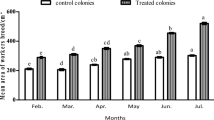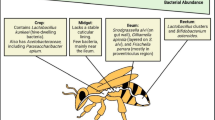Abstract
Apis mellifera is an important pollinator that has a prominent impact on crops’ ecological balance. Beekeeping provides us with more valuable products like honey, pollen, propolis, beeswax, and royal jelly. The ongoing era demands more scientific and environment-friendly strategies to improve the beekeeping sector internationally. Nowadays, the use of synbiotics (a combination of probiotics and prebiotics) has been declared as the need of the hour. However, little bit studies have been carried out in this regard. To improve the beekeeping sector in Pakistan, a study was designed to exploration of probiotic and organic acids on bee tissue ileum (small intestine). 108 Colony forming units (C.F.Us) of Bacillus clausii and Lactobacillus brevis were provided with and without mixing in 1.96% acetic acid, 2.91% acetic acid, and 2.99% lactic acid to caged worker bees under controlled laboratory conditions. The provision did not affect the intestine harmfully. The mean intestinal lumen diameters (μm2) were 133.33 ± 8.82, 63.33 ± 3.33, 186.67 ± 72.19, 250.00 ± 28.87, 166.67 ± 17.64, 193.33 ± 46.31, and 140.00 ± 61.10 in experiments (1, 2, 3, 5, and 6 respectively) compared to control’s 113.33 ± 38.44. Worker bees with better digestion conditions prove honeybee’s health and efficiency.



Similar content being viewed by others
Data availability
The datasets generated during and/or analyzed during the current study are available from the corresponding author on reasonable request.
References
Kuvanci A (2009) The effect of honey bees on pollination. J Apic Sci 5(2):12–15
Ozçağıran R (2002) Pollination process and pollen vectors in flowering plants. Ege Üniversitesi Ziraat Fakültesi Dergisi 39(2):151–158
Ozbek H (2003) Bees and pollination problem in Turkey. Uludağ Arıcılık Dergisi 16(3):41–44
Steen JJMVD, Kraker J, Grotenhuis JTC (2015) Assessment of the potential of honeybees (Apis mellifera L.) in biomonitoring of air pollution by cadmium, lead and vanadium. J Environ Prot 6:96–102
Silva-Zacarin ECM, Chauzat MP, Zeggane S, Drajnudel P, Schurr F (2012) Protocol for optimization of histological, histochemical and immuno histochemical analyses of larval tissues: application in histopathology of honey bee. Current Microscopy Contributions to Advances in Science and Technology 24 (3): 696-703
Al Naggar Y, Naiem E, Mona M, Seif A (2013) Honey bees and their products as a bioindicator of environmental pollution with heavy metals. Mellifera 13:26
Lebrun D (1985) Structures digestives et régimes alimentaires des termites. Actes Coll Inst Soc 2:43–44
Patruica S, Dumitrescu G, Popescu R, Filimon MN (2013) The effect of prebiotic and probiotic products used in feed to stimulate the bee colony (Apis mellifera) on intestines of working bees. JFAAE 3&4:2461–2464
Hasan A, Qazi JI, Muzaffer N, Jabeen S, Hussain A (2022a) Effect of organic acids and probiotics on growth of Apis mellifera workers. Pakistan. J Zool. https://doi.org/10.17582/journal.pjz/20210803100802
Hasan A, Qazi JI, Tabssum F, Hussain A (2022b) Feeding probiotics and organic acids to honeybees enhances acinal surface area of their hypopharyngeal glands. Res Vet Sci 149:47–50
Hasan A, Qazi JI, Tabssum F, Hussain A (2023) Increased bee venom production in Apis mellifera workers on the provision of probiotics and organic acids. Biocatal Agric Biotechnol 48:102616
Patruica S, Dumitrescu G, Stancu A, Bura M, Dunea IB (2012) The effect of prebiotic and probiotic feed supplementation on the wax glands of worker bees (Apis Mellifera). Anim Sci Biotechnol 45(2)
Kaznowski A, Szymas B, Gazdzinska E, Kazimierczak M, Paetz H (2005) The effect of probiotic supplementation on the content of intestinal microflora and chemical composition of worker honey bees (Apis mellifera L). J Apic Sci 44(1):10–14
Williams GR, Alaux C, Costa C, Csaki T, Doublet V, Eisenhardt D, Fries I, Kuhn R, McMahon DP, Medrzycki P, Murray TE, Natsopoulou ME, Neumann P, Oliver R, Paxton RJ, Pernal SF, Shutler D, Tanner G, van der Steen JJM, Brodschneider R (2013) Standard methods for maintaining adult Apis mellifera in cages under in vitro laboratory conditions 52(1)
Evans JD, Chen YP, Prisco GD, Pettis J, Williams V (2009) Bee cups: single-use cages for honey bee experiments. J Apic Res 48:300–302. https://doi.org/10.3896/IBRA.1.48.4.13
Martín-Hernández R, Meana A, García-Palencia P, Marín P, Botías C, Garrido-Bailón E, Barrios L, Higes M (2009) Effect of temperature on the biotic potential of honey bee microsporidia. Appl Environ Microbiol 75:2554–2557. https://doi.org/10.1128/AEM.02908-08
Alaux C, Ducloz F, Crauser D, Le Conte Y (2010) Diet effects on honey bee immunocompetence. Biol Lett 6(4):562–565. https://doi.org/10.1098/rsbl.2009.0986
Naug D, Gibbs A (2009) Behavioural changes mediated by hunger in honey bees infected with Nosema ceranae. Apidologie 40(6):595–599. https://doi.org/10.1051/apido/2009039
Carreck NL, Michael A, Brent CS, Cox-Foster D, Dade HA, Ellis JD, Hatjina F, Englesdorp DV (2015) Standard methods for Apis mellifera anatomy and dissection. J Apic Res 52(4). https://doi.org/10.3896/IBRA.1.52.4.03
Szymas B, Łangowska A, Kazimierczak-Baryczko M (2012) Histological structure of the midgut of honey bees (Apis mellifera L.) fed pollen substitutes fortified with probiotics. J Apic Sci 56:5–12. https://doi.org/10.2478/v10289-012-0001-2
Patruica S, Moţ D (2012) The effect of using prebiotic and probiotic products on intestinal micro-flora of the honeybee (Apis mellifera carpatica). B Entomol Res 102(6):619–623
das Dores Teixeira A, Marques-Araújo S, Zanuncio JC, Serrão JE (2014) Peritrophic membrane origin in adult bees (Hymenoptera): immunolocalization. Micron 68(4):91–97. https://doi.org/10.1016/j.micron.09.009
Szymas B (1994) Ocenawartościodżywczejsurogatówpyłkukwiatowegodlapszczołymiodnej (Apis mellifera L.). [Evaluation of the nutritive value of pollen substitute for honey bee (Apis mellifera L.) - in Polish] Rocz. AR Pozn., RozprawyNaukowe pp. 68
Crailsheim K, Pabst MA (1988) Der Einfluss von Honig mithohemMineralstoffgehalt auf die Sterblichkeit und das Mitteldarmgewebe der Honigbiene (Apis mellifera carnica Pollm) im Winter. Mitt Dtsch Gesallgangew Ent 6(2):125–135
Acknowledgements
The authors thank Dr. Shahid Ali, associate professor of Botany at F.G Degree College Rahwali Cantt for providing assistance in statistical analyses.
Code availability
Not applicable.
Author information
Authors and Affiliations
Contributions
JIQ conceived research and designed experiments; FT and NK participated in the design and interpretation of the data; AH performed experiments and analysis; AH and AH wrote the paper. All authors read and approved the final manuscript.
Corresponding author
Ethics declarations
Ethics approval
All authors have read the current manuscript.
Consent to participate
Not applicable.
Consent for publication
All authors have approved the current manuscript for publication.
Conflict of interest
The authors declare no competing interests.
Additional information
Responsible Editor: Maria Aparecida Scatamburlo Moreira
Publisher’s note
Springer Nature remains neutral with regard to jurisdictional claims in published maps and institutional affiliations.
Rights and permissions
Springer Nature or its licensor (e.g. a society or other partner) holds exclusive rights to this article under a publishing agreement with the author(s) or other rightsholder(s); author self-archiving of the accepted manuscript version of this article is solely governed by the terms of such publishing agreement and applicable law.
About this article
Cite this article
Hasan, A., Qazi, J.I., Tabssum, F. et al. Effect of organic acids and probiotics on intestinal health of Apis mellifera. Braz J Microbiol 54, 3231–3236 (2023). https://doi.org/10.1007/s42770-023-01121-z
Received:
Accepted:
Published:
Issue Date:
DOI: https://doi.org/10.1007/s42770-023-01121-z




